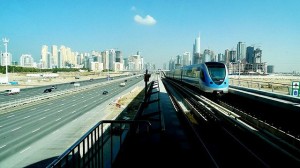By Hisham Wyn www.khaleejtimes.com
The importance of public transport for urban development cannot be overstated.
 There are obvious benefits; commuters do not waste productive hours stuck in traffic, ecological footprints shrink from their vapid enormity, and snarls of honking cars subside to slowly moving streams. For instance, the opening day of GITEX at the Dubai International Convention and Exhibition Centre saw common agreement among visitors that the metro was by far the best way of access, with a station metres away from the exhibition halls. This alternative reduced the usual interminable taxi queues, and traffic on the periphery was far more manageable than previous iterations.
There are obvious benefits; commuters do not waste productive hours stuck in traffic, ecological footprints shrink from their vapid enormity, and snarls of honking cars subside to slowly moving streams. For instance, the opening day of GITEX at the Dubai International Convention and Exhibition Centre saw common agreement among visitors that the metro was by far the best way of access, with a station metres away from the exhibition halls. This alternative reduced the usual interminable taxi queues, and traffic on the periphery was far more manageable than previous iterations.
Other benefits of the Dubai Metro are not as algebraic, but still noticeable, because mass transit ingrains itself into a city’s collective cultural psyche. For instance, the London Underground is quintessentially woven into the city’s narrative. Jokes and disdain abound for non-performing lines, and Tube delays play a regular role in the daily hustle. The New York Metro has been immortalised countless times in stories and films. It has been the imaginary venue for countless shootings, love affairs, chance encounters, and plot twists.
If France had a public transport system a few hundred years ago, one could almost imagine the confrontation between Les Miserables’ noble fugitive Val Jean and authoritarian policeman Javert happen in the second class cabin of a tram.
Public transport offers a collision of ideas and narratives by bringing strangers, acquaintances and sometimes closes friends into unexpected proximity. It generates ideas and stories – of which only some are picked up by the febrile minds of scriptwriters and storytellers. But do not for one minute assume that public transport is always a hub of communication and felicity. Londoners almost pride themselves on their surly aloofness on the Tube. Passengers on the Dubai Metro are, by comparison, genuinely gregarious. Neither are public transport journeys celebrations of excitement.
Most are safe, mundane and rather on time. Nothing very much out of the ordinary most of the time, save for a few merciful advertisements deviating from the norm of crusty non-creativity.
Nevertheless, public transport offers inclusive, egalitarian shared space invaluable to observers and storytellers. Despite some class and gender distinctions on the Dubai Metro, for the most part anyone with Dh4 on a plastic card can access it. This differentiates it from Dubai’s other, more tightly controlled, communal areas. The Dubai Metro is also a means to an end: it offers transit from point A to B, which imparts a sense of urgency and purpose different to that from a leisurely stroll on a public beach. Shadowing the main traffic arteries of the city, it is a dynamic and mobile interpretation of communal space where boarding passengers reflect areas’ cultural mix and demographics.
The next time you can, take the Metro. If not for the sake of reducing traffic, or slowly moving away from Dubai’s automobile centric culture, then simply for the epiphany of realising it gets you to your destination in comfort while giving you a stuttering film-reel look at the refreshing diversity of our city. For a city as insular and preoccupied with itself as Dubai, the Metro is not just a logistical salve for traffic logjams; it is a crucible of criss-crossing stories and a cauldron of accidental, incidental, interaction. It humanises us, and through us, almost humanises itself.
Hisham Wyne is a Dubai-based columnist, copywriter and radio commentator (www.hishamwyne.com). For comments, write to opinion@khaleejtimes.com
















